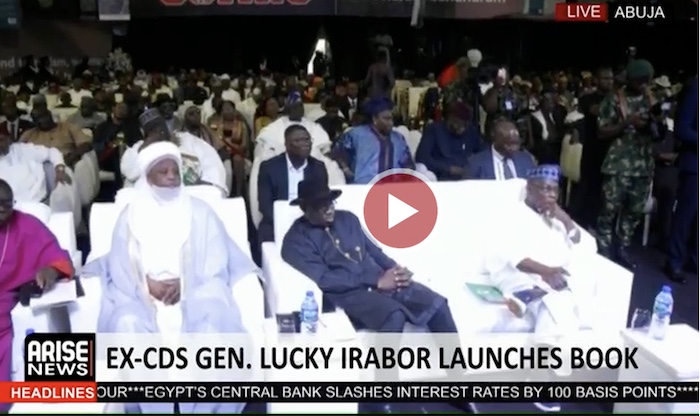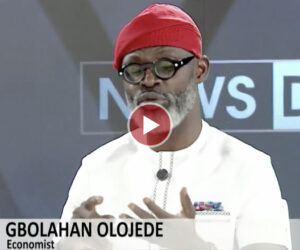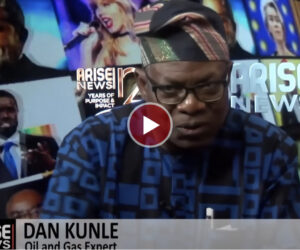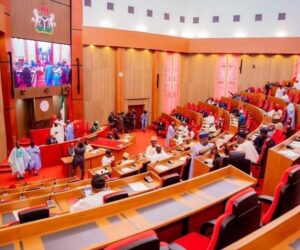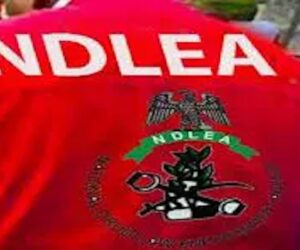Former President Goodluck Jonathan on Friday provoked a fresh controversy on the Boko Haram insurgency in Nigeria saying he would die with the scar of abduction of
Chibok girls.
He however expressed optimism that later on, people will know certain things about insurgency during his administration.
According to him, after Boko Haram appointed Muhammadu Buhari as its peace negotiator, it was expected that the crises would end when he (Buhari) took over as President in 2015, adding however that unfortunately, he could not stop it.
Jonathan stated these in Abuja during the public presentation of a book titled, “Scars: Nigeria’s Journey and The Boko Haram Conundrum”, written by a former Chief of Defence Staff, General Lucky Irabor (Rtd).
The book has been described as a positive contribution to military literature in Nigeria.
He said, “Irabor doesn’t play politics. Quite a lot of those in the special services play dirty politics. But Irabor doesn’t. The issue of Chibok girls is a scar I will live with till I die. But the truth will be out one day. I pray that one day those behind Boko Haram will document what they have done for people to know what they actually want. I battled Boko Haram till I left the office and thought it would have gone when Buhari became President.
“We took different options to deal with the problem. Boko Haram made Buhari negotiator and when he became President, we thought the problem would have been solved; but it didn’t end and till now, the problem is still there.”
Jonathan said he visited the most dangerous camps in the Niger Delta creeks when militancy was at it highest and was even warned never to come with weapons, adding “when we came back, that was the beginning of the peace.”
While querying why the Boko Haram issue has not been resolved since 2009, he said it should be approached differently for a better result.
Former President Olusegun Obasanjo, challenged those who know anything about Boko Haram to “speak out for us to find a solution.”
He said, “Boko Haram is debilitating and destructive to our present and future. I believe that we can get out of it. When we look for a solution, we can look beyond what we can see. Those who have things to say about Boko Haram, kidnapping, insurgency should speak out. We can’t go on in this way. I hope and appeal that those who have things to say should come up. Even those who have been on the other side should write and speak up for us to have a solution. This can’t continue without bringing it to an end.”
Former National Security Adviser (NSA), Major General Babagana Monguno (Rtd), shared his experiences describing it as “messy.”
He said, “From experience, I had the privilege of being in this messy Boko Haram problem. Two weeks after my appointment, Maiduguri exploded. We continued the process during Jonathan and I can tell you that Boko Haram is just a particular milestone in our journey. In terms of national security, it is an overwhelming impact. Today, 65 years after independence, we continue to grapple with the same issue. The years 1975-79 was the only time we had hopes in the country. The period projected itself on the national stage. The sun brightened on the Federal Republic of Nigeria. Thereafter, the issues at hand became so overwhelming.
“While the various governments contended with all these, the country became faced with three issues.
“All the issues in Nigeria can be solved only when there is national cohesion. It is important, it is this disposition that has not allowed us to think straight. We have moved from one side of the spectrum to the other and we became very embittered as a people in our nasty attitude to one another.
“I am not cursing us. To see the promised land will be a very big problem for us. The only thing that can help us is that it is something that can come within. If other countries like Rwanda can get their problems right, I see no reason why this monster and monkey can’t leave us.”
The reviewer of the book and Catholic Bishop of Sokoto Diocese, Bishop Matthew Hassan Kukah asked how Nigeria breeded these types of human beings.
He said, “The Nigerian government has gotten the name Boko Haram wrong. They are for the propagation of jihad and teachings of the prophet.
“Using military might and operation to fight Boko Haram was not the right approach but peaceful means is the best. If one operation didn’t succeed, why did we launch another operation? We are already in trouble. But how to get out of the trouble is the problem. The presence of soldiers in the 36 States of the country has made people feel that ours is an army of occupation. We can’t be on democracy and be surrounded by soldiers. We know that there are people with fat bank accounts funding them. The supporters of the Boko Haram leader fled when he had problems. The killing of its lo leader is the beginning of Boko Haram in Nigeria.”
The Sultan of Sokoto, identified the message of Boko Haram and what Jihad means in Islam.
He said, “They never claimed Boko is Haram because many of them are educated. Jihad is not to kill a non-muslim. We are living peacefully with one another. We may not be able to eliminate insurgency but we will put our efforts into it.”
The Chief of Defence Staff, General Christopher Musa, suggests the way forward to end Boko Haram.
He said, “It’s not just a military solution. If we want this to end, we must learn to live peacefully with one another. Boko Haram can be defeated, it’s the society’s approach. When it started, it should have been nipped in the bud. There are people outside who want the insurgency to continue. But we must not allow them to succeed.”
A former Chief of Defence Staff, General Alexander Ogomudia (Rtd), said, the country will solve the security situation when everyone begins to play a role.
He said, “If we take security as an enterprise, there must be a mission, structures, manpower, training, and procedures. The end of Boko Haram will come with the theory of revolutionary and counter-revolutionary warfare. Impunity is one of the reasons why insecurity has continued. People behind it should be dealt with accordingly. The leaders should start the solution to the problem at the beginning.”
The author, Lucky Irabor, said the book is a narrative of all the years of his experience as a military officer.
“The book is a painful truth. Let us remember the victims of Boko Haram. The book is not an indictment, it is a call for sustainable optimism. We can turn our scars into nationhood”, he said.
Friday Olokor, Abuja
Follow us on:

